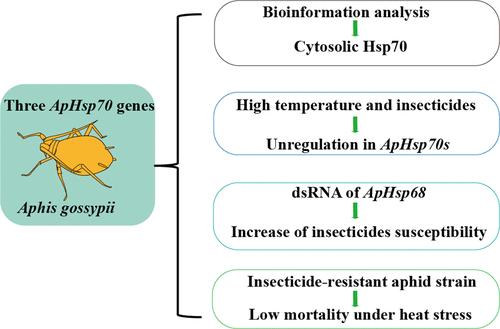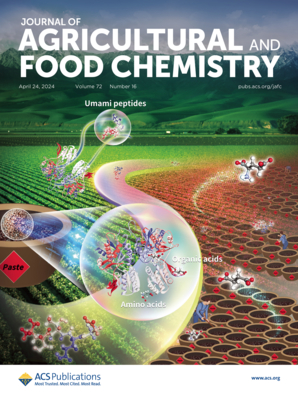Characterizing Three Heat Shock Protein 70 Genes of Aphis gossypii and Their Expression in Response to Temperature and Insecticide Stress
IF 5.7
1区 农林科学
Q1 AGRICULTURE, MULTIDISCIPLINARY
引用次数: 0
Abstract
Aphis gossypii is a highly polyphagous pest that causes substantial agricultural damage. Temperature and insecticides are two major abiotic stresses affecting their population abundance. Heat shock proteins play an essential role in cell protection when insects are exposed to environmental stresses. Three ApHsp70 genes were cloned from A. gossypii, and characterized their molecular features and expression profiles in response to temperature and insecticide stress. The deduced amino acid sequences of these proteins exhibited characteristic Hsp70 family signatures, and their tissue-specific expression patterns revealed their highest activity to be in the salivary glands under 35 °C. The temperature inductive assay further indicated that the expression of the three ApHsp70 genes was markedly upregulated under heat stress but not under cold shock. Furthermore, exposure to LC25 and LC50 concentrations of three insecticides triggered the upregulation of these ApHsp70 genes. The RNA interference (RNAi)-mediated suppression of ApHsp68 expression heightened cotton aphid’s susceptibility to insecticides (acetamiprid and sulfoxaflor). Moreover, our study found that the sulfoxaflor-resistant strain of A. gossypii (Sul-R) displayed a higher survival rate compared with the sulfoxaflor-sensitive strain (Sul-S) under heat shock conditions. These results suggest that these three ApHsp70 genes play an essential role in response to both heat and insecticide stress.

棉蚜热休克蛋白70三个基因的表达及其对温度和杀虫剂胁迫的响应
棉蚜是一种高度多食性的害虫,对农业造成严重危害。温度和杀虫剂是影响其种群丰度的两大非生物胁迫。当昆虫暴露于环境压力时,热休克蛋白在细胞保护中起重要作用。从棉蚜中克隆了3个apsp70基因,分析了它们在温度和杀虫剂胁迫下的分子特征和表达谱。这些蛋白的氨基酸序列显示出Hsp70家族特征,其组织特异性表达模式显示其在35°C下的唾液腺中活性最高。温度诱导实验进一步表明,在热应激条件下,3个apsp70基因的表达均显著上调,而在冷休克条件下则无明显上调。此外,暴露于LC25和LC50浓度的三种杀虫剂会触发这些apsp70基因的上调。RNA干扰(RNAi)介导的抑制apsp68表达增强了棉蚜对杀虫剂(啶虫脒和亚砜)的敏感性。此外,我们的研究发现,在热休克条件下,棉蚜抗亚砜菌株(sull -r)的存活率高于对亚砜菌敏感的菌株(sull -s)。这些结果表明,这三个apsp70基因在高温和杀虫剂胁迫反应中发挥了重要作用。
本文章由计算机程序翻译,如有差异,请以英文原文为准。
求助全文
约1分钟内获得全文
求助全文
来源期刊
CiteScore
9.90
自引率
8.20%
发文量
1375
审稿时长
2.3 months
期刊介绍:
The Journal of Agricultural and Food Chemistry publishes high-quality, cutting edge original research representing complete studies and research advances dealing with the chemistry and biochemistry of agriculture and food. The Journal also encourages papers with chemistry and/or biochemistry as a major component combined with biological/sensory/nutritional/toxicological evaluation related to agriculture and/or food.

 求助内容:
求助内容: 应助结果提醒方式:
应助结果提醒方式:


